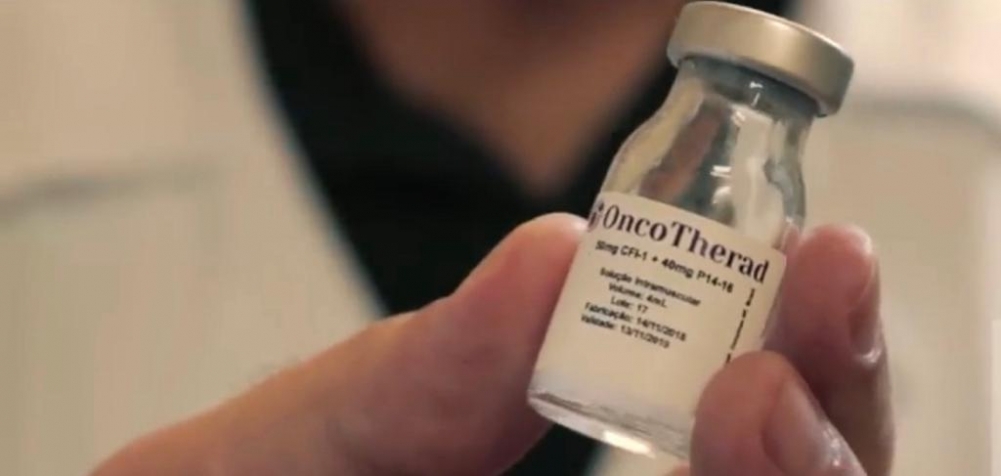


The clinical trial involved 44 volunteers with advanced bladder cancer. The award of a US patent should facilitate cooperation between the researchers and the pharmaceutical industry to proceed to the next stage of drug development (photo: researchers’ archive)
Published on 01/31/2022
By Karina Toledo | Agência FAPESP – A drug developed at the University of Campinas (UNICAMP) in the state of São Paulo, Brazil, and recently patented in the United States has performed promisingly in the treatment of bladder cancer. The results of a clinical trial involving 44 patients with an advanced form of the disease were presented at the 22nd Brazilian Clinical Oncology Conference, held in November 2021 in Salvador, Bahia.
The experimental treatment eliminated the tumor in 77.3% of the participants, and the disease returned less intensely in the other cases. The volunteers have been tracked for two years, and so far none has died or required surgical removal of the bladder. The investigation is supported by FAPESP.
“The immunotherapy drug we used was entirely developed at a Brazilian public university. The patent is 100% owned by its inventors. This is disruptive and unprecedented for Brazil. It opens up the possibility of negotiating with large pharmaceutical companies, which can help us bring the product to market,” Wagner José Fávaro, a professor at UNICAMP’s Institute of Biology, told Agência FAPESP.
Fávaro and Nelson Duran, a professor in the same department, invented the drug, which is called OncoTherad. To complete the final stages of drug development, they founded a startup called Nanoimmunotherapy Pharma Ltda. (NIMM-Pharma), and expect to patent it in Europe as well, with the support of UNICAMP’s innovation agency (INOVA).
They began developing the drug about 13 years ago with the aim of stimulating the immune system to combat infectious diseases and tumors. It consists of a totally synthetic nanoparticle that induces an immune response based on T cells, activating this type of lymphocyte to produce interferon, an important protein in combating cancer as well as some viruses and bacteria.
The research has also been supported by FAPESP via the National Institute of Science and Technology in Complex Functional Materials (INOMAT), led by Fernando Galembeck, a professor at UNICAMP’s Chemistry Institute.
The scientists recently began testing the drug as part of a cocktail to treat severe cases of COVID-19 (more at: agencia.fapesp.br/33454). The bladder cancer study is more advanced, however.
Methodology
The clinical trial reported to the conference of the Brazilian Society of Clinical Oncology (SBOC) and awarded its science prize (Prêmio SBOC de Ciência) began in 2018 at the Municipal Hospital of Paulínia, a city not far from Campinas, and was overseen by urologist João Carlos Cardoso Alonso. The trial initially recruited 58 volunteers, but only 44 (30 men and 14 women) met all the inclusion criteria.
“The aim was to test the safety and efficacy of the immunotherapy drug with patients who didn’t respond to first-line treatment for non-muscle-invasive bladder cancer,” Fávaro said, explaining that bladder cancer usually starts in the tissue that lines the inner surface of the bladder. Muscle-invasive tumors can metastasize and are considered high-risk. Treatment in these cases consists of surgical removal of the bladder (radical cystectomy), whereas non-muscle-invasive tumors, or about 70% of cases, can be treated by transurethral resection (removal of abnormal tissue through the urethra), followed by local applications of BCG, the Bacillus Calmette-Guérin vaccine used against tuberculosis. The hope is that BCG will activate the immune system and prevent the tumor from returning.
“BCG immunotherapy was first used in 1976. Nothing better has been developed since then. The problem is that the tumor reappears in about half of all patients,” Fávaro said.
When the disease returns in the non-invasive form, the option is usually another resection followed by immunotherapy. “When it persists even after two cycles of BCG, complete bladder removal is indicated. It’s at this point in the disease that we decided to test the efficacy of OncoTherad,” he explained. “All participants in the trial were candidates for radical cystectomy but either did not present the clinical conditions for surgery owing to their age or associated diseases or refused the recommended treatment.”
OncoTherad was administered intravesically and by intramuscular injection (in the buttocks) for the first six weeks. After that, the drug was administered once a fortnight for six months, followed by monthly applications until the end of the second year of treatment. The patients were examined every three months to see how the cancer was evolving.
After 18 months, 77.3% remained free of the disease. In ten patients, the tumor returned with a lower grade than during the clinical trial, and the lesions were removed by scraping. In two others, the tumor returned after the first 18 months, also in attenuated form. None of the patients has required complete bladder removal to date.
The reported side-effects include cystitis (inflammation of the bladder), a burning sensation while urinating, joint pain, skin itchiness and redness, low fever, and abdominal pain. “These are mild symptoms. They were resolved with a small amount of corticosteroid. None of the volunteers had to abandon the treatment because of side-effects,” Fávaro said.
The next steps in development of the drug, he added, depend on talks with pharmaceutical companies and with ANVISA, Brazil’s health surveillance agency.
“The Phase 2 and 3 multicenter clinical trials, which are mandatory for commercialization of the drug, will require a manufacturing structure with certification by ANVISA. The US patent should help us in this process of negotiation with the regulators,” he said.
The article “Role of OncoTherad nanoimmunotherapy in BCG-unresponsive non-muscle-invasive bladder cancer: an open-label and single-arm phase 1/2 study” is at: ccm.iweventos.com.br/evento/sboc2021/trabalhosaprovados/naintegra/100754.
Source: https://agencia.fapesp.br/37840